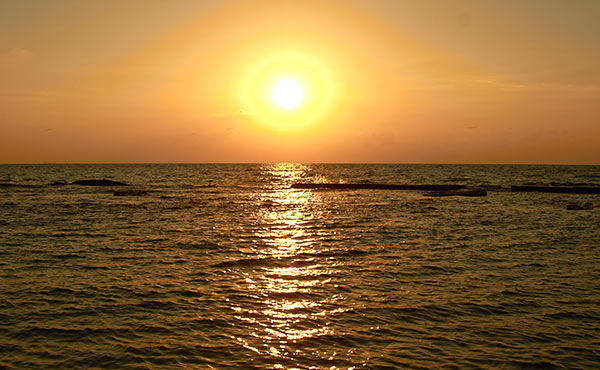A Short History of Caesarea Maritima
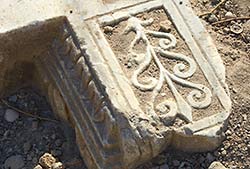 A long time ago (more precisely between 586 BC and 332 BC), either the Phoenicians, or anyone else built a small harbor on the deserted shore and called this "Straton Tower". Who was that Straton, where he went, nobody knows. May be a small Sidonian king, or Straton - it was something like a general rank. The Persians were rulers of this land it that times.
A long time ago (more precisely between 586 BC and 332 BC), either the Phoenicians, or anyone else built a small harbor on the deserted shore and called this "Straton Tower". Who was that Straton, where he went, nobody knows. May be a small Sidonian king, or Straton - it was something like a general rank. The Persians were rulers of this land it that times.
in 96 BC The Jewish king Alexander Yannai came, captured this shore, kicked the Phoenicians out and settled the terrain with Jews. After 33 years, the Roman commander Pompei came, captured Judea, drove Jews out and settled the city with Greeks. In 30 BC Emperor Augustus, granted the terrain and the village to Herod, the king of the autonomous region of Judea as part of the Roman Empire. Judea thus received access to the sea, and the Jewish population again appeared in the city.
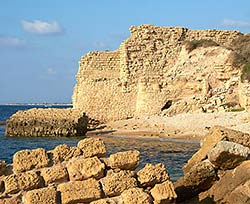 In 20 BC Herod the large scale construction started and for some 10 years a sniffed little village turned into a pearl of the Mediterranean with a first -class seaport, which had an extensive protected harbor cold match with the ports of Athens and Alexandria.
In 20 BC Herod the large scale construction started and for some 10 years a sniffed little village turned into a pearl of the Mediterranean with a first -class seaport, which had an extensive protected harbor cold match with the ports of Athens and Alexandria.
It was decided to name the city as Keisaria in honor of Caesar Octavian, the then emperor. This was very forersighted, since name Caesar turned into a title from behalf, and the city, at the next transit of the power, was not the need to rename. Other territories also picked up a patriotic initiative, Caesareas multiplied, so our town for certainty began to be called Ceasarea Meritima or Ceasarea Palaestinae.
in 6 BC Emperor Augustus sent the son of Herod Archelai to exile, his possession included in to the Roman Judea (Syria Palaestina), and Kesaria become it administrative center. Under the emperor of Tiberia in Caesarea, a well -known character from the New Testament Pontius named Pilate lived and worked here as a Roman prefect, as the inscription on a stone found near the local theater tell. This town is generally mentioned in the Bible very often.
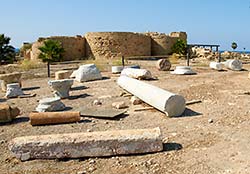 The main communities of Caesarea in those days were Greeks, Samaritans and Jews. There were no much friendship between communities in the promised land. In 66 AD uncertain Greek brought chicken and a clay pot to the city synagogue and made a demonstrative sacrifice. It was a very dirty hint to Jews, the meaning of which is now a little clear. The mutual massacre began, the pogroms, the Romans intervened, and ... etc. According to some version, the first Jewish war of 66-73 D, as a result of which the Jews were expelled from the country, and Jerusalem was destroyed had it's origin in this event.
The main communities of Caesarea in those days were Greeks, Samaritans and Jews. There were no much friendship between communities in the promised land. In 66 AD uncertain Greek brought chicken and a clay pot to the city synagogue and made a demonstrative sacrifice. It was a very dirty hint to Jews, the meaning of which is now a little clear. The mutual massacre began, the pogroms, the Romans intervened, and ... etc. According to some version, the first Jewish war of 66-73 D, as a result of which the Jews were expelled from the country, and Jerusalem was destroyed had it's origin in this event.
A considerable Jewish community was seen in Caesarea only at the end of the second century, at that time there was already a very significant Christian community. Names such as Eusebius of Caesarea (historian, archbishop), Pamphil (famous Caesarean biliotek), Origen (philosopher, theologian) are now world famous. In Byzantium, Caesarea was the capital of the province of Palestine Prima (from the 390th).
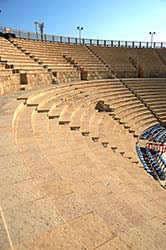 In 614, the Caesarea was seized by the Persians, in the army of which the Jews made up a significant part. The city surrendered without much resistance. Caesarea became part of the Jewish province of the Sassanid Empire with the capital in Jerusalem. In 625, the Byzantines (Emperor Irakli) again repelled the city, but in the mid-30s of the 7th century a new misfortune come - Arabs of Caliph Umar. Caesarea fell in 640 after a long siege.
In 614, the Caesarea was seized by the Persians, in the army of which the Jews made up a significant part. The city surrendered without much resistance. Caesarea became part of the Jewish province of the Sassanid Empire with the capital in Jerusalem. In 625, the Byzantines (Emperor Irakli) again repelled the city, but in the mid-30s of the 7th century a new misfortune come - Arabs of Caliph Umar. Caesarea fell in 640 after a long siege.
John Tzimishiy in 975 captured Galileo and took possession of Caesaria during the offensive on Jerusalem,however, he could not gain a foothold here for a long time and the Arabs restored the status quo in a couple of years. Arabs were little interested in shipping, so Keysaria Arabic against Caesaria of Byzantine had the size of much more modest.
In May 1011, the city was blocked by the Genoese fleet and crusaders of the Jerusalem king Baldwin I from the shore. The city was besieged and stormed. Caesarea became the main port of the Crusader’s state, until 1187 than again the Arabs of Saladin took it almost without resistance. In 1191 all again has been changed - the crusaders of Richard Lion's Heart took possession of the city, and in the 1250s they built new fortress walls. In 1265, the Mamelukes of the Sultan Beibars came and demolished everything to hell, after which till the middle of the 17th century no one disturbed the sad ruins.
In the 1660s, about 100 Muslim families from Morocco settled on the city ruins. Syria was belonged to the Ottoman Empire since 1516. In 1884, the Turks settled here refugees from Bosnia (670 people) conquered by Austria-Hungary. Bosnyaks began to live fishing.
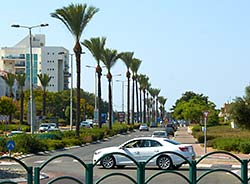 In 1940, a Jewish cybutz of the pits appeared on the southern outskirts of the old Caesarea. In January 1948, the Bosnian village was fired by the militants of the Lehi organization, after which the majority of the Muslim population fled, and in February of the same year, a detachment of PALMAH under the commander of Yitzhak Rabin captured the village and demolished all Arab houses.
In 1940, a Jewish cybutz of the pits appeared on the southern outskirts of the old Caesarea. In January 1948, the Bosnian village was fired by the militants of the Lehi organization, after which the majority of the Muslim population fled, and in February of the same year, a detachment of PALMAH under the commander of Yitzhak Rabin captured the village and demolished all Arab houses.
In 1952, the modern Caesarea was founded north of the Old City, and a national archaeological park was established on the site of ancient ruins in 2011.
Traveler experience
As I've been traveling from Tel Aviv to Caesarea by regular bus, I watched the following scene: our bus was cut off by a cheeky taxi, and the bus driver, catching up with that taxi at the next intersection, got out, pulled the taxi driver out of the car and fill a muzzle right in front of the peace-loving general public. Whether that taxi driver was a peaceful Arab, or vice versa, the most real Jew, I could not discern because of the speed of events. However, as a true internationalist, I consider this not important, because it was on the right cause.
It was the first impression. Then of course - the old Crusader fortress, ancient Roman ruins, amphitheatres, aqueducts and other Jewish antiquities. Now I can’t even believe that all this happened with me, especially when I sit here in St.Petersburg winter with overboard +0 temperature, sleet in the morning, you can’t get out without rubber boots, a storm warning for the region was made, and it gets dark at 5 pm ...
Land forts and fortress:
Bip Castle Gatchina Ivangorod Izborsk Kexholm Kirillov Monastery Koporye Novgorod Pechorskiy Monastery Peter&Paul Fortress Porkhov Pskov Schlisselburg Staraya Ladoga Tikhvin Vyborg Hameenlinna Hamina Kastelholm Kymenlinna Lappaenranta Raseborg Castle Savonlinna Tavetti Turku Visby Fredrikstadt Fredriksten Hegra Fort Hoytorp Fort Arensburg Narva Tallinn Antipatris Caesarea Jerusalem Latrun Fort Masada
Sea forts and fortresses:
Alexander Fort Ino Fort Krasnaya Gorka Fort Kronstadt: city and Kotlin isl. Kronstadt: North Forts Kronstadt: South Forts Trongsund Hanko Svartholm Sveaborg Marstrand Siaro Fort Vaxholm Oscarsborg
Artillery batteries and individual guns:
Hemso Fort
Fortified areas and defensive lines:
Karelian Fortified Area (KaUR) KrUR Leningrad Mannerheim Line Nevsky Bridgehead VT Line Harparskog Line Salpa Line Gothland
Russian
S e a r c h All news

